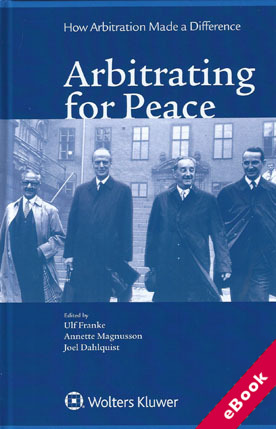
The device(s) you use to access the eBook content must be authorized with an Adobe ID before you download the product otherwise it will fail to register correctly.
For further information see https://www.wildy.com/ebook-formats
Once the order is confirmed an automated e-mail will be sent to you to allow you to download the eBook.
All eBooks are supplied firm sale and cannot be returned. If you believe there is a fault with your eBook then contact us on ebooks@wildy.com and we will help in resolving the issue. This does not affect your statutory rights.
Arbitrating for Peace: How Arbitration Made a Difference focuses on the geopolitical role played by international arbitration over the centuries.
The book convincingly demonstrates how international arbitration has made a difference and contributed to peaceful resolution of conflicts. Although short of attaining the ideal of a ‘substitute for war’, arbitration has largely succeeded in peacefully resolving international disputes.
Beyond that, arbitral commitments and arbitral processes have deepened civilized and cooperative international relations, promoted the development of international law and international institutions, and facilitated the well-being of mankind in important ways. Particulars of that proposition are set forth in this one-of-a-kind book.
What’s in this book:-
With a chapter devoted to each of the twelve landmark international arbitration cases – primarily state-to-state but also including commercial disputes with geopolitical dimensions – this book shows how arbitration has resolved disputes in such circumstances as the following:-
Each chapter is written by a practitioner and/or academic of high international standing. The project was initiated by the Stockholm Chamber of Commerce, which celebrates its centennial in 2017 coinciding with the publication of this book.
How this will help you:-
International arbitration is treated either in niche publications, written in a legalese terminology and aimed at lawyers with a special interest, or in a very general way in popular publications. This book bridges this gap by placing arbitration in a wider historical context, thereby making the subject more accessible beyond the narrow circle of specialists without losing its legal relevance.
By focusing on landmark cases, the book contributes to a continued dynamic development of dispute resolution in complicated or sensitive geopolitical contexts and demonstrates how arbitration has and can continue to play an important role for this purpose. Practitioners, political decision-makers and academics in any part of the world with an interest in international arbitration and international law or political history will find this book not only deeply informative but also immensely useful.